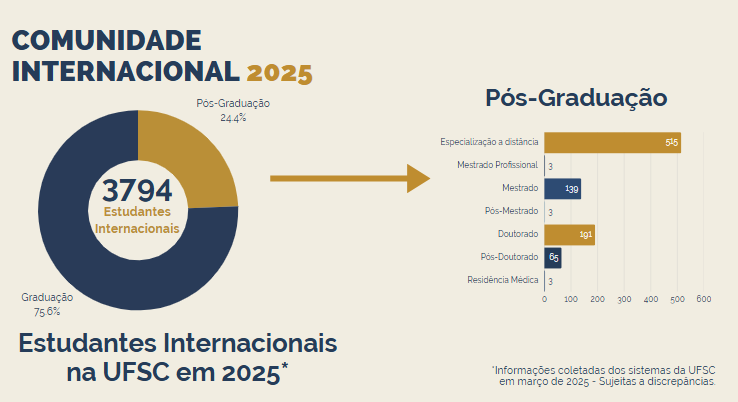Botin Foundation launches 16th edition of the Programme for the Consolidation of the Civil Service in Latin America
This post is available in Brazilian Portuguese only. Please access the website in Portuguese to read it.
This post is available in Brazilian Portuguese only. Please access the website in Portuguese to read it.
This post is available in Brazilian Portuguese only. Please access the website in Portuguese to read it.
On Monday, 10 March, the Universidade Federal de Santa Catarina (UFSC) will welcome its international community for the first semester of 2025. The event, “UFSC International Community Welcome Day”, is organized by the Office of International Relations (SINTER/UFSC) with support from the Institutional Program for Educational Support to Students (PIAPE) of the Prorectorate for Undergraduate Studies and Basic Education (PROGRAD), the outreach project “SINTEGRA: International Student Paths: support and integration”, and members of the Association of Angolans in Florianópolis (ASSAF).
The event is especially dedicated to international students arriving at UFSC this semester, including both degree-seeking and exchange students. The study buddies of exchange students are also invited to participate.
This semester, UFSC expects to welcome 88 exchange students from 15 countries into its undergraduate programs. Among them, 69 students are part of the Incoming Program, coming from partner universities in France (24), Portugal (9), Italy (7), and other countries. The remaining students are part of Association of Montevideo Group Universities (AUGM) Escala Estudiantes de Grado Program, arriving from Argentina (6) and Uruguay (2).
Additionally, 15 international degree-seeking students will be joining UFSC through the Programa de Estudantes-Convênio de Graduação (PEC-G). Among them, eight will be studying at the Florianópolis campus: five from Angola (Chemical Engineering, Social Work, Administration, Accounting and Electrical Engineering); one from Paraguay (Medicine); one from Cape Verde (Medicine); and one from Guinea-Bissau (International Relations).
Four PEC-G students will be attending the Joinville campus: one from Mozambique (Railway and Metro Engineering); one from Honduras (Aerospace Engineering); one from Angola (Naval Engineering); and one from Equatorial Guinea (Aerospace Engineering). Likewise, three PEC-G students will be attending the Araranguá campus: one from Angola (Computer Engineering); one from Mozambique (Energy Engineering); and one from Equatorial Guinea (Medicine).
In addition to these students, UFSC is also welcoming international degree-students students admitted through different pathways, such as the university entrance exam or external transfer.
The illustrations below provide an overview of the new international students at UFSC:



About the Welcome Day schedule:
The event will take place at the School of Philosophy and Human Sciences (CFH) on the Trindade campus (Florianópolis).
This post is available in Brazilian Portuguese only. Please access the website in Portuguese to read it.
This post is available in Brazilian Portuguese only. Please access the website in Portuguese to read it.
This post is available in Brazilian Portuguese only. Please access the website in Portuguese to read it.
This post is available in Brazilian Portuguese only. Please access the website in Portuguese to read it.